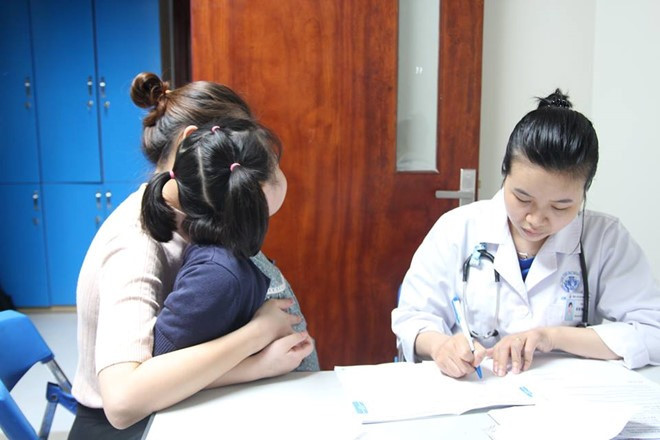 Dozens of confused and anxious parents are showing up at the Children’s Hospital No 1 in HCM City every month (Photo: zing.vn)
Dozens of confused and anxious parents are showing up at the Children’s Hospital No 1 in HCM City every month (Photo: zing.vn) Hanoi (VNS/VNA) - Dozens of confused and anxious parents are showing upat the Children’s Hospital No 1 in HCM City every month.
They want to know why their children are turning into adults years earlier thannormal.
A 42-year-old mother from Tan Phu district said that her six-year-old daughterwas developing breasts and pubic hair, but did not think much of it. But whenthe little girl had her periods just a year later, the mother freaked out andrushed to the hospital.
The girl was diagnosed with precocious puberty, and had to have regularinjections for three years to suspend sexual growth until she reached thenormal age for puberty.
Such stories are not uncommon these days, especially in big cities where thenumber of early puberty cases has shot up dramatically in the last few years.
The Children’s Hospital No 1 reports that they receive roughly 30 cases ofprecocious puberty a month, and are about 200 children are being treatedcurrently. The increase is remarkable, compared to less than 10 cases a year adecade ago.
A similar increase has also been seen in the capital city of Hanoi. Accordingto the National Children’s Hospital, approximately 500 children were treatedfor early puberty this year alone, 2.5 times higher than just three years ago.
Doctor Tran Thi Bich Huyen of the Children’s Hospital No 1’s Department ofKidney and Endocrinology told the Tuoi tre (Youth) newspaper thatmany young girls and boys between six and eight years old were showing signs ofprecocious puberty.
While the girls were developing breasts and menstruating, the boys wereexperiencing penis enlargements and pubic hair growth, two to three yearsearlier than the earliest normal occurrence, she said.
“The cause for most of precocious puberty cases in girls is unknown, while 50percent of the boys have tumours in their brain or elsewhere,” she added.
Doctor Ho Thi Ngoc Bich, also from the same department, said some linkages havebeen observed between obesity and premature puberty.
The high consumption of animal protein was also associated with early puberty,which might explain why the problem was reported more among children in majorcities, where the living standards are generally better than in rural areas.
The usual prescribed treatment for early puberty is injections to suppressparticular hormones, estrogen in girls and testosterone in boys, which triggerpuberty.
Those who receive this treatment will see suspension of breast development,pubic hair growth and/or menstruation, helping them psychologically, whilelowering the risk of sexual molestation, Huyen said.
The medication could also improve the height of children experiencing earlypuberty. They are generally at a higher risk of being shorter than their peers.
It is widely believed that precocious puberty seals growth plates and reducesadult height. The children having early puberty tend to be taller than theirfriends at a very young age, but end up shorter as adults.
However, the hormone suppression treatment has not proven effective in heightimprovement for children above six, Huyen said.
The girl in Tan Phu district was seven years old when she started havingthe monthly injections. The medication ceased three years later, when she wasabout 1m48 tall. Now, at 14, she is only 3cm higher. Other than that, she isgrowing into a woman normally.
Huyen warned that parents should not buy drugs by themselves to treat theproblem, noting that health insurance schemes fully covers treatment forpremature puberty. She said parents should take their children to hospitals fora thorough examination instead of trying to solve the problem on their own.
“Some parents buy drugs outside and inject their children with the hope ofsuspending puberty. But it is very risky,” she said.
“Wrong use of the drugs can result in abnormal puberty, harming the childrenphysically and emotionally.” -VNA




























